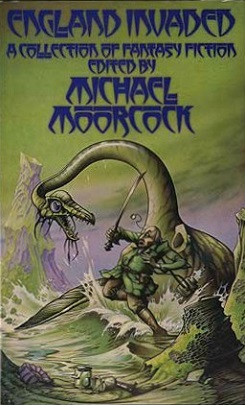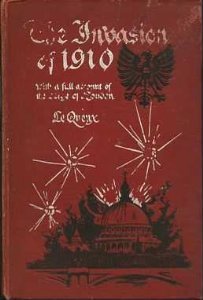Related Research Articles

Cyberpunk is a subgenre of science fiction in a dystopian futuristic setting said to focus on a combination of "low-life and high tech". It features futuristic technological and scientific achievements, such as artificial intelligence and cyberware, juxtaposed with societal collapse, dystopia or decay. Much of cyberpunk is rooted in the New Wave science fiction movement of the 1960s and 1970s, when writers like Philip K. Dick, Michael Moorcock, Roger Zelazny, John Brunner, J. G. Ballard, Philip José Farmer and Harlan Ellison examined the impact of technology, drug culture, and the sexual revolution while avoiding the utopian tendencies of earlier science fiction.

Spy fiction is a genre of literature involving espionage as an important context or plot device. It emerged in the early twentieth century, inspired by rivalries and intrigues between the major powers, and the establishment of modern intelligence agencies. It was given new impetus by the development of fascism and communism in the lead-up to World War II, continued to develop during the Cold War, and received a fresh impetus from the emergence of rogue states, international criminal organizations, global terrorist networks, maritime piracy and technological sabotage and espionage as potent threats to Western societies. As a genre, spy fiction is thematically related to the novel of adventure, the thriller and the politico-military thriller.

Hector Hugh Munro, popularly known by his pen name Saki and also frequently as H. H. Munro, was a British writer whose witty, mischievous and sometimes macabre stories satirize Edwardian society and culture. He is considered by English teachers and scholars a master of the short story and is often compared to O. Henry and Dorothy Parker. Influenced by Oscar Wilde, Lewis Carroll and Rudyard Kipling, Munro himself influenced A. A. Milne, Noël Coward and P. G. Wodehouse.

William Ford Gibson is an American-Canadian speculative fiction writer and essayist widely credited with pioneering the science fiction subgenre known as cyberpunk. Beginning his writing career in the late 1970s, his early works were noir, near-future stories that explored the effects of technology, cybernetics, and computer networks on humans, a "combination of lowlife and high tech"—and helped to create an iconography for the Information Age before the ubiquity of the Internet in the 1990s. Gibson coined the term "cyberspace" for "widespread, interconnected digital technology" in his short story "Burning Chrome" (1982), and later popularized the concept in his acclaimed debut novel Neuromancer (1984). These early works of Gibson's have been credited with "renovating" science fiction literature in the 1980s.
Historical fiction is a literary genre in which a fictional plot takes place in the setting of particular real historical events. Although the term is commonly used as a synonym for historical fiction literature, it can also be applied to other types of narrative, including theatre, opera, cinema, and television, as well as video games and graphic novels. It often makes many use of symbolism in allegory using figurative and metaphorical elements to picture a story.
Leonard Cyril Deighton is a British author. His publications have included cookery books and works on history, but he is best known for his spy novels.
Canadian literature is written in several languages including English, French, and to some degree various Indigenous languages. It is often divided into French- and English-language literatures, which are rooted in the literary traditions of France and Britain, respectively. The earliest Canadian narratives were of travel and exploration.
Genre fiction, also known as formula fiction or popular fiction, is a term used in the book-trade for fictional works written with the intent of fitting into a specific literary genre in order to appeal to readers and fans already familiar with that genre.

Alice Ann Munro was a Canadian short story writer who won the Nobel Prize in Literature in 2013. Her work tends to move forward and backward in time, with integrated short story cycles.

William Tufnell Le Queux was an Anglo-French journalist and writer. He was also a diplomat, a traveller, a flying buff who officiated at the first British air meeting at Doncaster in 1909, and a wireless pioneer who broadcast music from his own station long before radio was generally available; his claims regarding his own abilities and exploits, however, were usually exaggerated. His best-known works are the anti-French and anti-Russian invasion fantasy The Great War in England in 1897 (1894) and the anti-German invasion fantasy The Invasion of 1910 (1906), the latter becoming a bestseller.
The Riddle of the Sands: A Record of Secret Service is a 1903 novel by Erskine Childers. The book, which enjoyed immense popularity in the years before World War I, is an early example of the espionage novel and was extremely influential in the genre of spy fiction. It has been made into feature-length films for both cinema and television.

Invasion literature is a literary genre that was popular in the period between 1871 and the First World War (1914–1918). The invasion novel was first recognised as a literary genre in the UK, with the novella The Battle of Dorking: Reminiscences of a Volunteer (1871), an account of a German invasion of England, which, in the Western world, aroused the national imaginations and anxieties about hypothetical invasions by foreign powers; by 1914 the genre of invasion literature comprised more than 400 novels and stories.

The Battle of Dorking: Reminiscences of a Volunteer is an 1871 novella by George Tomkyns Chesney, starting the genre of invasion literature and an important precursor of science fiction. Written just after the Prussian victory in the Franco-Prussian War, it describes an invasion of Britain by a German-speaking country referred to in oblique terms as The Other Power or The Enemy.

England Invaded is an anthology of imaginative fiction, including invasion literature, from the Victorian and Edwardian periods, edited by British author Michael Moorcock. Originally published in hardback by W. H. Allen in 1977, it was re-issued as a paperback by Star in 1980.

The Great War in England in 1897 was written by William Le Queux and published in 1894.
A war novel or military fiction is a novel about war. It is a novel in which the primary action takes place on a battlefield, or in a civilian setting, where the characters are preoccupied with the preparations for, suffering the effects of, or recovering from war. Many war novels are historical novels.

The Swoop!, or How Clarence Saved England is a short comic novel by P. G. Wodehouse, first published in the United Kingdom by Alston Rivers Ltd. in London on 16 April 1909. Its subtitle is A Tale of the Great Invasion.

The Invasion of 1910 is a 1906 novel written mainly by William Le Queux. It is one of the most famous examples of invasion literature. It is viewed by some as an example of pre-World War I Germanophobia. It can also be viewed as prescient, as it preached the need to prepare for war with Germany.

A hypothetical military victory of the Axis powers over the Allies of World War II (1939–1945) is a common topic in speculative literature. Works of alternative history (fiction) and of counterfactual history (non-fiction) include stories, novels, performances, and mixed media that often explore speculative public and private life in lands conquered by the coalition, whose principal powers were Nazi Germany, Imperial Japan, and Fascist Italy.

The War of the Worlds is a science fiction novel by English author H. G. Wells. It was written between 1895 and 1897, and serialised in Pearson's Magazine in the UK and Cosmopolitan magazine in the US in 1897. The full novel was first published in hardcover in 1898 by William Heinemann. The War of the Worlds is one of the earliest stories to detail a conflict between humankind and an extraterrestrial race. The novel is the first-person narrative of an unnamed protagonist in Surrey and his younger brother who escapes to Tillingham in Essex as London and Southern England are invaded by Martians. It is one of the most commented-on works in the science fiction canon.
References
- ↑ When William Came; a story of. OCLC. OCLC 841713896 . Retrieved 3 November 2014– via OCLC Worldcat.
- ↑ Gibson, Brian (23 June 2014). Reading Saki: The Fiction of H.H. Munro. McFarland. p. 203. ISBN 9781476615325.
- ↑ Gibson, Brian (31 May 2012). "'The Unrest-Cure' and Saki's Uneasy Anti-Semitism". Jewish Culture and History. 9 (1): 27–50. doi:10.1080/1462169X.2007.10512065. S2CID 162284702.
- ↑ Hitchens, Christopher (June 2008). "Where the wild things are: the enduring, untamable appeal of Saki's short stories". The Atlantic. 301 (5): 109.
- ↑ Kemp, Peter (3 October 2004). "Masters of Shock and Awe". Sunday Times (London).
- ↑ Jones, Nigel (May 2014). Peace and War: Britain In 1914. Head of Zeus. p. 30. ISBN 9781781852583.
- ↑ Stearn, Tom (2008). "The Case for Conscription". History Today. 58 (4).
- ↑ Hitchner, Thomas (2010). "Edwardian Spy Literature and the Ethos of Sportsmanship: the sport of spying". English Literature in Transition: 1880-1920. 53 (4): 413–430. Retrieved 3 November 2014.
